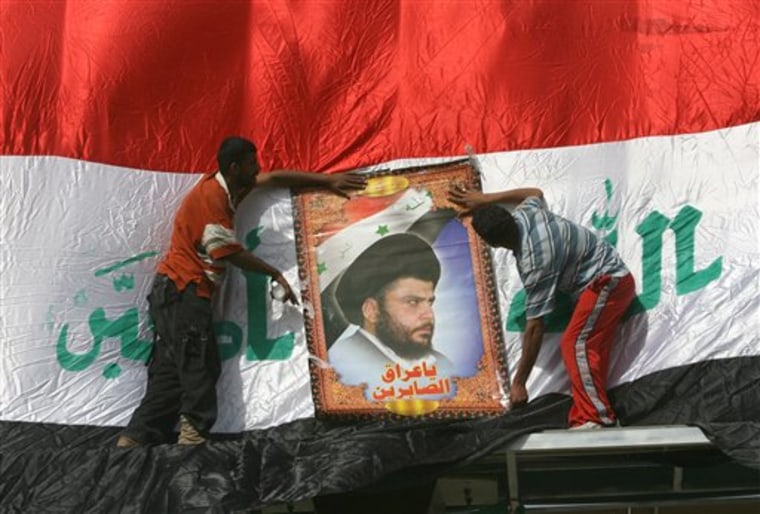Prime Minister Nouri al-Maliki's ruling Shiite coalition withheld support Sunday for the proposed security pact that would keep U.S. troops here for three more years, dealing a setback to American hopes of a speedy approval of the agreement.
The statement by the United Iraqi Alliance called for unspecified changes to the draft agreement, which parliament must ratify by the end of the year when the U.N. mandate expires.
The group's move comes a day after tens of thousands of demonstrators, mostly Shiites, took to the streets of Baghdad to show their opposition to the agreement.
The Shiite alliance holds 85 of parliament's 275 seats and al-Maliki needs solid support from the alliance to win approval of the agreement by a strong majority.
Lawmakers poised to vote
The 30 lawmakers loyal to anti-American Shiite cleric Muqtada al-Sadr have already said they will vote against the agreement, and some Sunni lawmakers have spoken out against it too.
In its statement, the alliance said the agreement, hammered out in months of difficult negotiations, contained some "positive points" but more time was needed "for discussion, dialogue and to amend some of its articles."
The alliance established a committee to solicit views and study the agreement in detail, the statement added.
The alliance did not specify what it considered positive or negative, and Foreign Minister Hoshyar Zebari warned it would be difficult to reopen negotiations.
Hassan al-Suneid, a member of the alliance from al-Maliki's party, said members had reservations about portions "that don't comply with Iraq's sovereignty."
"We cannot talk today about rejection or acceptance in the absolute," al-Suneid told The Associated Press. "There are weak and strong points," including a timeline for the departure of American troops.
Timetable for withdrawal
The agreement provides for American troops to leave Baghdad and other Iraqi cities by the end of June and withdraw from the country entirely by the end of 2011 unless the government asks them to stay.
It would also give Iraq limited authority to prosecute U.S. soldiers and contractors for crimes committed off post and off duty, limit U.S. authority to search homes and detain people and give Iraqis more say in the conduct of American military operations.
Some lawmakers complained the language in the draft was vague, especially those governing U.S. military operations and legal jurisdiction over American troops and contractors.
Although the alliance did not reject the accord outright, the review process within a coalition whose leaders negotiated the accord could well mean that parliament will not vote on the agreement until after the Nov. 4 U.S. election.
Many Iraqi lawmakers say privately they still need U.S. troops because the Iraqi military and police alone are incapable of handling security nationwide despite the sharp drop in violence since last year.
Divisions define Iraqi politics
But approval has been complicated by next year's provincial and national elections, as well as the narrow partisan interests, sectarian and ethnic divisions that have defined Iraqi politics since the 2003 collapse of Saddam Hussein.
Iraqi politicians fear positions they take on the security pact will determine how they will fare at the ballot box, since many voters are anxious to see U.S. troops leave. Iraqi control of their own country is a burning issue in a nation that once saw itself as the beacon of pan-Arab nationalism.
Furthermore, many Shiite politicians have close ties to neighboring Iran, where they lived in exile during Saddam's rule. Shiite-dominated Iran strongly opposes the agreement.
Pact with U.S. to serve as a model
On Sunday, Iranian Foreign Minister Manouchehr Mottaki said Washington's plan for a security deal with Iraq was futile because Iraqis "have announced their opposition" to the deal, the official Islamic Republic News Agency reported from Tehran.
The pact with the U.S. is expected to serve as a model for a separate agreement on the future of the 4,100 British troops in Iraq as well as the handful of other countries that remain in the coalition.
Al-Maliki said Sunday he would appoint a team soon to start discussions with Britain.
"It is the time to build the best relationships with the countries that stood with Iraq against dictatorship in order to build a modern state," al-Maliki said in a statement after meeting with British Defense Secretary John Hutton.
Al-Maliki told The Times of London last week that British forces are no longer necessary to provide security but there may be a need for a few of them for training and technical issues.
Despite security improvements, attacks continue, albeit at their lowest levels in four years.
Two bombs exploded Sunday near separate Iraqi police in the Shiite-dominated southeast Baghdad neighborhood of Zafaraniya, killing two people and wounding a total of 17, police and hospital officials said.
The U.S. military reported two dead and two wounded and blamed Shiite extremists.
In the north, Turkish warplanes Sunday bombed Kurdish rebel hideouts inside Iraqi territory, according to an Iraqi Kurdish official.
Helgurv Khider, an official of the semiautonomous Kurdish region in northern Iraq, said the bombings targeted four towns near the Turkish border. He gave no information on possible casualties. There was no immediate Turkish military confirmation of the airstrikes.
The military has carried out a series of air raids against suspected positions in northern Iraq used by Kurdish rebels to stage attacks across the border in Turkey. Attacks have escalated since Kurdish rebels killed 17 soldiers on Oct. 3.
